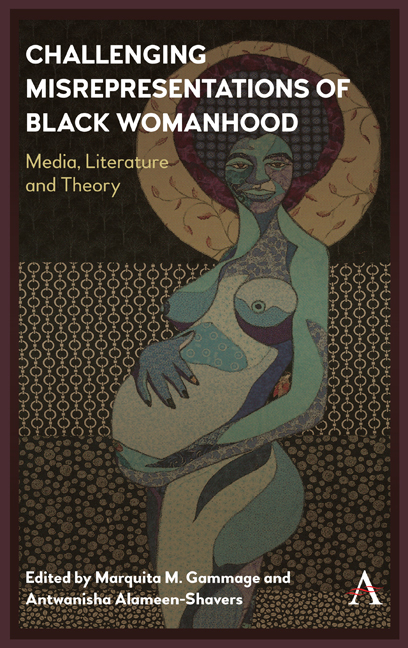Book contents
- Frontmatter
- Contents
- List of Figures
- Acknowledgments
- Introduction
- Chapter 1 Black Student Mothers: A Culturally Relevant Exploratory Study
- Chapter 2 Uninhabitable Moments: The Symbol of Serena Williams, Rage and Rackets in Claudia Rankine's Citizen: An American Lyric
- Chapter 3 “Black Women Are Genius!”: The Image of Celebrated Black Motherhood in Stand-Up Comedy?
- Chapter 4 The Virility of the Haitian Womb: The Biggest Threat to the Dominican Right
- Chapter 5 Ladyhood in Distress: Neoliberalism and Black Politics in Nicole Sconiers's Escape from Beckyville: Tales of Race, Hair, and Rage
- Chapter 6 Sapphires Gone Wild: The Politics of Black Women's Respectability in the Age of the Ratchet
- Chapter 7 Representing the Black Woman as Immoral and Abandoning the Black Family: A Cultural Analysis of Twenty-First-Century Television Dramas Starring Black Women
- Chapter 8 Historical Miseducation on Black Womanhood
- Chapter 9 Michelle Obama Laughs: Political Meme Warfare and the Regurgitation of the Mythological Black Woman
- Chapter 10 Kawaida Womanism as an Interpretative Framework for Understanding Africana Womanhood: Analyzing African American Women's Self-Perceptions
- List of Contributors
- Index
Chapter 7 - Representing the Black Woman as Immoral and Abandoning the Black Family: A Cultural Analysis of Twenty-First-Century Television Dramas Starring Black Women
Published online by Cambridge University Press: 29 May 2019
- Frontmatter
- Contents
- List of Figures
- Acknowledgments
- Introduction
- Chapter 1 Black Student Mothers: A Culturally Relevant Exploratory Study
- Chapter 2 Uninhabitable Moments: The Symbol of Serena Williams, Rage and Rackets in Claudia Rankine's Citizen: An American Lyric
- Chapter 3 “Black Women Are Genius!”: The Image of Celebrated Black Motherhood in Stand-Up Comedy?
- Chapter 4 The Virility of the Haitian Womb: The Biggest Threat to the Dominican Right
- Chapter 5 Ladyhood in Distress: Neoliberalism and Black Politics in Nicole Sconiers's Escape from Beckyville: Tales of Race, Hair, and Rage
- Chapter 6 Sapphires Gone Wild: The Politics of Black Women's Respectability in the Age of the Ratchet
- Chapter 7 Representing the Black Woman as Immoral and Abandoning the Black Family: A Cultural Analysis of Twenty-First-Century Television Dramas Starring Black Women
- Chapter 8 Historical Miseducation on Black Womanhood
- Chapter 9 Michelle Obama Laughs: Political Meme Warfare and the Regurgitation of the Mythological Black Woman
- Chapter 10 Kawaida Womanism as an Interpretative Framework for Understanding Africana Womanhood: Analyzing African American Women's Self-Perceptions
- List of Contributors
- Index
Summary
Contemporarily, Black women writers, directors, producers and production companies have expanded their presence, and their media productions have been major hits. As a result, over the past 10 years media has increased its representations of Black women as leading actresses. Today, television dramas are a primary outlet for showcasing depictions of Black womanhood. Although television dramas are not marketed as “reality,” these shows have often been based on real Black women, and even when not, the limited images of Black women in the media prohibits a diverse representation of Black womanhood. Thus, these shows are some of the only portrayals of Black women in the media. Currently, the leading television dramas starring Black women are written, directed and produced by Black women. Given this shift in the production of images of Black womanhood, it is imperative that a cultural analysis be conducted to determine if this shift has resulted in any significant changes to the image of Black womanhood. This research provides a historical-cultural analysis of current popular television dramas starring Black women to determine if media portrayals of Black womanhood align with Black family cultural characteristics.
African American family values have been directly derived from and influenced by indigenous African cultural values. These values have largely been maintained despite centuries of oppression, racism and existence in a foreign environment. In fact, the Black family system has been the central hub for maintaining the African worldview and indoctrinating future generations into the African American culture (Nobles 1997; Sudarkasa 1997). Although ancient and indigenous African lifestyles have been altered/adjusted to survive in America, African ways of being, especially as it pertains to the family structure and functions, are still highly practiced among African Americans (Nobles 1997; Sudarkasa 1997). Women in particular are fundamental to the African concepts of family and are therefore highly valued in African cultures (Oyewumi 2001). African women play an essential role in the process of life as child bearers and in the sustainability of cultural traditions and values, as they groom and prepare new family members for active participation in society. In fact, African American women's role within the Black family system is modeled on these same principles of womanhood. Thus, the Black woman operates as a central hub for her kinship.
- Type
- Chapter
- Information
- Challenging Misrepresentations of Black WomanhoodMedia, Literature and Theory, pp. 135 - 154Publisher: Anthem PressPrint publication year: 2019



